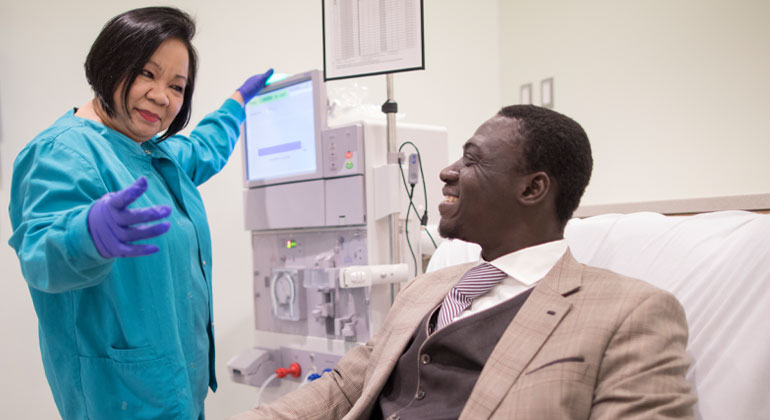Polycystic Kidney Disease

If one or both of your parents has been diagnosed with or carries the gene for polycystic kidney disease (PKD), you have a chance of developing the disease. It is one of the most common genetic diseases in the United States that can affect you at any age.
The severity of the disease depends on the number of cysts that grow in the kidneys, their size, and how much the growth of cysts interferes with kidney function. If you are experiencing kidney problems and a parent has the disease or genetic testing shows positive results, Mount Sinai's team of experts can help you.
Our team of highly ranked nephrologists has the expertise to diagnose, manage, and treat all forms of PKD. In addition, we have one of the leading research labs in the nation dedicated to studying people with PKD.
What Is PKD?
As its name indicates, polycystic kidney disease involves many cysts forming on and in the kidneys. Cysts are fluid-filled sacs that can grow larger and increase in number over time, causing the kidneys to become enlarged. The cysts are not cancerous, but as kidneys become enlarged and overrun with cysts, you may lose kidney function, leading eventually to kidney failure.
In some cases, cysts may also develop in the liver and other parts of the body, causing serious complications in the brain and heart. Another common complication of the disease is high blood pressure.
Types of PKD
The most common type, representing approximately 90 percent of all cases of inherited PKD, is autosomal dominant polycystic kidney disease (ADPKD). With ADPKD, if one parent has the disease, there is a 50 percent chance for each offspring to develop it, too. This form of the disease typically starts in adulthood, but can develop in childhood.
Another. much less common type of inherited PKD is autosomal recessive polycystic kidney disease (ARPKD). With ARPKD, two parents must carry the gene, and even then, there is only a 25 percent chance that each offspring will have it too. This form of the disease typically starts close to birth, but can occur later in childhood.
Symptoms
The following symptoms may indicate that you need to be examined and possibly diagnosed and treated for polycystic kidney disease:
- Blood in the urine
- Headaches
- High blood pressure
- Kidney stones and infections
- Pain in the back or side
- Swelling of the abdomen and feeling full
- Urinary tract infections
Diagnosis
To diagnose cysts in the kidney, we may use various imaging tests: ultrasound, computed tomography scan, and magnetic resonance imaging. This also allows us to see how much of your healthy kidney remains functional.
Treatments We Offer
Once we have a clear picture of your kidneys, we can address your needs. We bring together specialists who tailor your care by using minimally invasive surgery to remove infected or bleeding cysts, medical genetics, urology, cardiology, pediatrics, and nutrition, all to help you. While there is no cure for PKD, we use highly advanced treatments and preventive therapies to relieve many of your symptoms.
Mount Sinai nephrologists and collaborating specialists employ a full range of medical and support services throughout the courses of your treatment. We pride ourselves in caring for our PKD patients with:
- Continuity of care. At all ages and stages of the disease, our nephrologists work in close collaboration with pediatric nephrologists to transition your children with PKD from pediatric care to adult PKD care.
- Genetic counseling. Our genetics department specializes in evaluating and counseling you and your family with a history of PKD.
- Transplantation. We work closely with our transplant team and may suggest that you get an evaluation for a kidney transplant. Our Recanati/Miller Transplantation Institute surgeons and physicians, along with specialized nurses and social workers, coordinate care before and after kidney transplantation.
In addition to our Mount Sinai Health System community of clinicians and researchers, we consult with the New York chapter of the PKD Foundation. We attend annual PKD conferences and participate in the Walk for PKD.